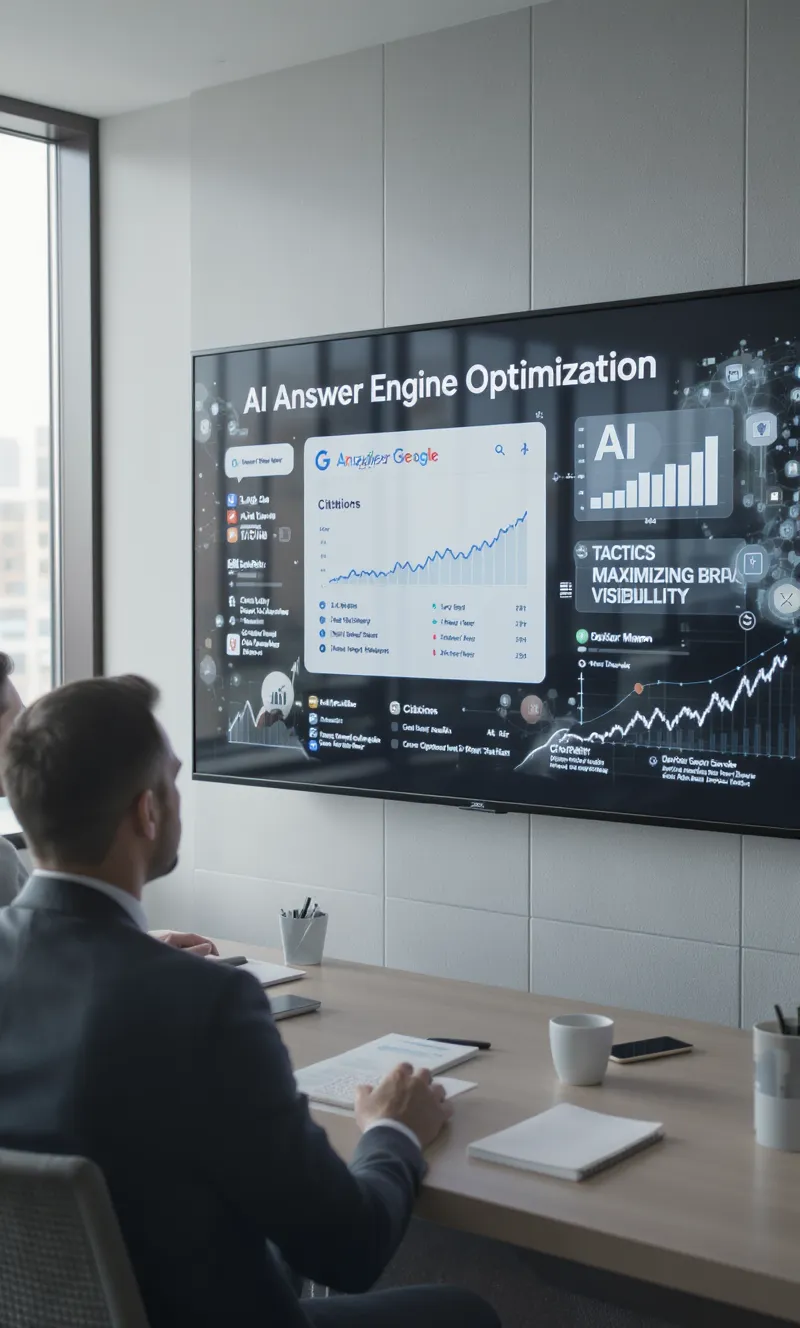AI Answer Engine Optimization Strategies for LLM SEO

In the evolving digital landscape of 2025, AI answer engine optimization (AEO) has emerged as a critical frontier for businesses and marketers. With large language models (LLMs) increasingly powering search experiences, the traditional SEO playbook is undergoing a seismic shift. This transformation is not just about ranking in search results; it’s about being the authoritative source that AI systems reference directly in their answers.
The stakes are high. Studies indicate that AI-powered search tools like ChatGPT Search, Google AI Overviews, and Perplexity have already reshaped user behavior, with over 30% of U.S. adults using them weekly. Organic traffic for informational queries has dropped by up to 25% compared to just two years ago, and zero-click AI answers now account for 70% of queries. In this environment, brands that fail to adapt risk becoming invisible.
This article will explore comprehensive tactics for mastering AI answer engine optimization and LLM SEO strategies, from building AI-friendly content structures to multi-platform optimization, citation tracking, and future-proofing your brand presence.
AI answer engines are quickly replacing search as humanity's primary source of truth. Winning in the LLM era means ensuring your brand is consistently the cited authority across all major AI platforms.
Understanding AI Answer Engine Optimization
AI answer engine optimization focuses on positioning your content so that LLM-powered platforms cite it as a trusted source. Unlike traditional SEO, where keywords and backlinks dominate, AEO prioritizes authority signals, factual precision, and content formatting that AI models can easily parse.
Key Differences from Traditional SEO
- Emphasis on citations rather than rankings
- Structured data for machine parsing
- Question-driven headings and conversational tone
- Multi-modal content integration
| Metric | Traditional SEO | AEO |
|---|---|---|
| Primary Goal | Rank in SERPs | Be cited in AI answers |
| Content Format | Long-form keyword-rich | Concise, factual, structured |
| Measurement | Ranking position | Citation frequency |
The shift from keyword ranking to citation optimization changes every aspect of SEO strategy.
Structuring Content for LLM-Friendly Parsing
Large language models excel at extracting concise, well-structured information. This means your content must be easy for machines to interpret without losing depth for human readers.
Tactical Steps:
- Use bullet points for key facts
- Provide short, direct answers to common questions
- Include schema markup for entities, reviews, and FAQs
- Maintain a logical heading hierarchy
Traditional SEO is about chasing algorithms. LLM SEO is about teaching AI systems who you are, what you know, and why you should be trusted enough to be cited in their answers.
Citation Optimization: The New Ranking
Citation frequency is now the currency of visibility. Platforms like Rank Prompt and Profound allow you to track how often your brand is mentioned in AI-generated answers.
Strategies:
- Publish original research that AI can reference
- Collaborate with industry influencers who produce content AI models train on
- Ensure your content is factually accurate and updated regularly
| Platform | Citation Rate | Opportunity |
|---|---|---|
| ChatGPT | 15% | High |
| Google AI Overviews | 12% | High |
| Perplexity | 14% | Medium |
As seen above, most brands have significant room for improvement.
Multi-Platform LLM SEO Tactics
Optimizing for one AI engine is not enough. Each platform has different parsing methods and trust signals.
Key Considerations:
- Adapt content for varying formats (short answers for ChatGPT, detailed for Perplexity)
- Use multimedia elements (videos, infographics) that AI can reference
- Maintain consistent branding across all content
Leveraging Structured Data for AI Models
Schema markup helps AI models understand and attribute content correctly. This includes marking up authorship, publication dates, product details, and FAQs.
Recommended Types:
- Article schema
- FAQPage schema
- Product schema
- Review schema
Implementing these increases the likelihood of accurate AI citations.
Case Studies: Winning in the LLM Era
Consider a SaaS company that integrated AEO tactics in early 2024. By focusing on concise, authoritative content and tracking citations, they increased AI mentions by 200% in six months. Organic traffic dropped slightly, but referral traffic from AI engines surged.
| Metric | Before | After |
|---|---|---|
| AI Citations | 50/month | 150/month |
| Organic Traffic | 100k | 95k |
| AI Referral Traffic | 5k | 20k |
This demonstrates that in the LLM era, citation growth can offset traditional traffic declines.
Advanced Techniques for LLM SEO
Experienced marketers can leverage advanced tactics such as:
- Embedding factual microcontent throughout long-form articles
- Creating content clusters around high-value questions
- Using AI monitoring tools to identify citation gaps
Niche Applications and Edge Cases
Certain industries, such as healthcare or legal services, require heightened accuracy and compliance. In these cases, structured citations and authoritative sourcing are non-negotiable.
Tools and Resources
Recommended tools:
- Rank Prompt: Citation tracking
- Profound: AI visibility analytics
- Schema.org: Structured data resources
Troubleshooting Common AEO Challenges
If your brand is not being cited:
- Audit content for factual completeness
- Improve entity recognition with schema
- Increase content distribution to AI-friendly platforms
Summary Insights
The LLM era requires a paradigm shift in SEO strategy. Focus on citation frequency, AI-friendly content structures, and multi-platform optimization.
Conclusion
AI answer engine optimization is more than a trend; it’s the future of digital visibility. By embracing LLM SEO tactics, brands can secure their place as trusted sources in AI-driven search. The key takeaway: prioritize being referenced, not just ranked. Implement structured data, track citations, and produce original, authoritative content. The brands that adapt now will lead the conversation tomorrow.
Brian Dean’s insight captures it well: If you’re still doing SEO the old way, you’ll struggle to rank in AI-driven search results. The game now is original, authoritative content that AI can confidently pull into its answers.